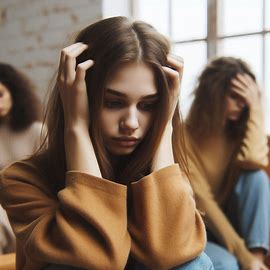By Daniela Cobián Navarro
Member of the U-Report Mexico Committee
Today, mental health has become a key issue for my generation. We not only face the normal challenges of growing up, studying, and pursuing a future, but also the constant pressure of a rapidly changing world. Between economic crises, global conflicts, and social media, our emotional well-being has become a priority. Although the topic is being discussed more and many institutions have recognized it, it is often not treated with the urgency and seriousness it deserves.
The constant expectations and comparisons people face on social media have created an environment where many of us feel like we're never enough. We're always expected to give our all, but we're rarely taught how to deal with pressure or prioritize our emotional well-being. This not only affects people's mental health but also limits our ability to thrive.
However, instead of remaining solely concerned, in recent years, we young people have decided to take action. During my time as an activist on the U-Report Mexico committee (a committee created by UNICEF and comprised of young people nationwide), I worked with a team to bring the issue of mental health to more people, not only to inform them, but also to propose solutions.
In May 2024, we organized the launch of a podcast launched by UNICEF internationally and focused on youth mental health called "On My Mind." What made this event special was that it was led entirely by young people themselves. From the organization to the moderation, we were able to engage more people in the conversation and bring to the table topics and questions that adults often avoid.
Additionally, this podcast was specifically designed to provide tools for those without access to therapy. Through breathing techniques, reflections on grief, managing difficult emotions, and daily habits, we hope more young people can begin to take care of their mental well-being in an accessible way.
From 2023 to the present, we've held forums, interviews with experts, and social media campaigns on this same topic. Over time, we realized that, in many cases, young people prefer to listen and learn from other young people rather than prioritize institutions or opinion leaders, who feel far removed from our reality. It's not that we don't trust them, but we share a different, more realistic, and less complicated understanding.
Social media has been key throughout this journey. As we know, mental health used to be a rarely discussed topic; now, it's everywhere. More and more young people are sharing resources, experiences, and advice on how to manage anxiety, stress, and peer pressure. Instead of waiting for others to come up with solutions, we've found ways to support each other and network.
Even so, there are still enormous challenges. In many places, mental health is still not taken seriously. At school, for example, getting good grades is often more important than being emotionally well. At home, the idea persists that mental health is "overblown" or something that can be easily fixed with a scolding or even a home remedy. Although there is now more information, there are also too many myths that continue to minimize the issue or make it seem less important than it really is.
That's why I firmly believe it's necessary to continue creating spaces where we can talk about what we think, but also to better understand what's happening around us. If, starting now, as young people, we learn to view reality with more empathy and awareness, we will be better prepared to face the future. I would love for public policies in Mexico to be promoted that truly prioritize youth mental health, implemented with our voices and experiences. Because if young people are listened to and acted upon, I have no doubt that we can build a more just, stronger future with young people who truly feel supported.






